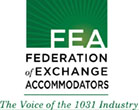What is Section 1031
Like-Kind Exchange
1031 Exchange
Tax Deferred Exchange
Section 1031 like-kind exchanges are a tax mechanism, where a property owner substitutes an investment property for another, deferring the capital gains tax until the replacement property is sold. The Internal Revenue Code provides that like-kind exchange tax-deferral treatment applies only to properties held for productive use in a trade or business, or for investment.
The property owner’s investment in the asset is reinvested in the replacement property—value not reinvested or non-like-kind property received in the exchange is subject to tax in the year of the exchange.
The like-kind exchange under Section 1031 is tax-deferred, not tax-free. When the replacement property is sold, the original deferred gain, plus any additional gain realized over the course of the life of the investment, is subject to tax.
How Like-Kind Exchanges Work
A property owner wishing to exchange property using a Section 1031 like-kind exchange employs a Qualified Intermediary (QI) to facilitate the exchange. The proceeds of sale of the relinquished property are transferred into the possession of the QI—the independent third party—because tax rules prohibit the taxpayer from having receipt or control of the sale proceeds.
The law specifies that the taxpayer has a 45-day window to formally identify a property to serve as a replacement to the original. If a suitable property is not identified, the exchange fails and the QI returns the exchange funds to the taxpayer.
If the taxpayer identifies replacement property, the exchange continues. The taxpayer must acquire the replacement property within 180 days from the start of the exchange. When the taxpayer is ready to close on the acquisition of the replacement property, the QI sends the exchange funds necessary for the purchase directly to the closing. Any funds remaining after the exchange terminates are returned to the taxpayer and tax is paid on those unspent funds.
Qualified Intermediaries
A Qualified Intermediary (QI) is an independent, third-party who facilitates the exchange transaction, holds the exchange funds until they can be spent for acquisition of replacement property, and ensures that taxpayers are not in direct possession of the proceeds of the relinquished property sale. QIs are a feature of a tax safe harbor provided by the Section 1031 Treasury Regulations.
Tax rules require that QIs must be independent and unrelated to other interests of the taxpayer. Fundamentally, they must not be deemed to be an agent of the taxpayer.
Federation of Exchange Accommodators
The Federation of Exchange Accommodators (FEA) is the only national trade association organized to represent professionals who conduct like-kind exchanges under Internal Revenue Code Section 1031. Members include Qualified Intermediaries (QIs), their primary tax and legal counsel, and affiliated industries that provide services to QIs or their clients.
The FEA offers a Certified Exchange Specialist (CES®) professional designation for QIs that have demonstrated knowledge and experience in facilitating exchanges.
The “Lock-In” Effect
Section 1031 provides a solution to the “lock-in” problem of the taxpayer who is unable or unwilling to sell investment property because of the burden that capital gains and recapture taxes would place on the taxpayer’s cash flow and net worth. Essentially, without an exchange, the tax burden could outweigh the benefit of the sale, so the taxpayer continues to hold onto the property. Carried across the wider economy, transactional activity and the resulting economic activity are curtailed. By deferring the tax until the replacement property is sold, the immediate burden is lifted, motivating the taxpayer to modify their assets to fit their current needs.
Amendments and Limitations to Section 1031
Section 1031 remained largely in its original form until the introduction of the Qualified Intermediary safe harbor in 1991 and the limitation of eligible assets to real property in the Tax Cuts and Jobs Act in 2017. Currently, like-kind exchanges are only applicable to investment and business-use real estate assets.
